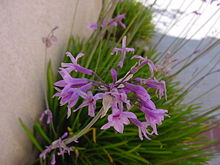Tulbaghia
| Society garlic | |
|---|---|

| |
| Tulbaghia violacea | |
| Scientific classification | |
| Kingdom: | Plantae |
| Clade: | Tracheophytes |
| Clade: | Angiosperms |
| Clade: | Monocots |
| Order: | Asparagales |
| Family: | Amaryllidaceae |
| Subfamily: | Allioideae |
| Tribe: | Tulbaghieae |
| Genus: | Tulbaghia L. 1771, conserved name not Heister 1755 |
| Synonyms[1] | |
| |

Tulbaghia (wild garlic[2] or society garlic) is a genus of monocotyledonous herbaceous perennial bulbs native to Africa,[3] belonging to the amaryllis family. It is one of only two known genera in the society garlic tribe within the onion subfamily.[4] The genus was named for Ryk Tulbagh (1699–1771), one time governor of The Cape of Good Hope.[5]
Most species are native to the Eastern Cape Province of South Africa. As is common to many members of the Allioideae, when their leaves are bruised they produce a distinct garlic smell, hence its common name. The flowers are borne in an umbel. Each flower has six narrow tepals. A characteristic of the genus is that there is a "corona" – a raised crown-like structure – at the centre of the flower. This may be small and scale-like or may be larger, somewhat like the trumpet of a small narcissus.[6]
- Tulbaghia acutiloba Harv. – Botswana, Lesotho, Eswatini, South Africa
- Tulbaghia aequinoctialis Welw. ex Baker – Angola
- Tulbaghia alliacea L.f., syn. Tulbaghia affinis – Botswana, Zimbabwe, Zambia, South Africa
- Tulbaghia calcarea Engl. & Krause – Namibia
- Tulbaghia cameronii Baker – Cameroon, Zaire, Tanzania, Malawi, Mozambique, Zambia, Zimbabwe, Namibia
- Tulbaghia capensis L. – Cape Province
- Tulbaghia cernua Fisch. – Botswana, Lesotho, South Africa
- Tulbaghia coddii Vosa & R.B.Burb. – Mpumalanga
- Tulbaghia cominsii Vosa – Cape Province
- Tulbaghia dregeana Kunth – Cape Province
- Tulbaghia friesii Suess. – Nyanga Mountains of Mozambique + Zimbabwe
- Tulbaghia galpinii Schltr. – Cape Province
- Tulbaghia leucantha Baker – Botswana, Lesotho, Eswatini, South Africa, Zambia, Zimbabwe, Namibia
- Tulbaghia ludwigiana Harv. – Eswatini, South Africa
- Tulbaghia luebbertiana Engl. & Krause – Namibia
- Tulbaghia macrocarpa Vosa – Zimbabwe
- Tulbaghia montana Vosa – Cape Province
- Tulbaghia natalensis Baker – Cape Province, KwaZulu-Natal
- Tulbaghia nutans Vosa – Mpumalanga
- Tulbaghia pretoriensis Vosa & Condy – Gauteng
- Tulbaghia rhodesica R.E.Fr. – Tanzania, Zambia
- Tulbaghia simmleri Beauverd – Northern Province
- Tulbaghia tenuior K.Krause & Dinter – Cape Province, Namibia
- Tulbaghia transvaalensis Vosa – Limpopo, KwaZulu-Natal
- Tulbaghia verdoornia Vosa & R.B.Burb. – Cape Province
- Tulbaghia violacea Harv. – Society garlic[8] – Cape Province, KwaZulu-Natal; naturalized in Tanzania + Mexico
- formerly included[3]
A few names have been coined using the name Tulbaghia, but applied to species now considered better suited to the genus Agapanthus.
- Tulbaghia africana – Agapanthus africanus
- Tulbaghia heisteri – Agapanthus africanus
- Tulbaghia minor – Agapanthus africanus
- Tulbaghia praecox – Agapanthus praecox
References[edit]
- ^ Tulbaghia L. Plants of the World Online. Retrieved 29 September 2023.
- ^ USDA, NRCS (n.d.). "Tulbaghia". The PLANTS Database (plants.usda.gov). Greensboro, North Carolina: National Plant Data Team. Retrieved 12 December 2015.
- ^ a b c World Checklist of Selected Plant Families, The Board of Trustees of the Royal Botanic Gardens, Kew, retrieved 2011-11-13, search for "Tulbaghia"
- ^ Stevens, P.F., Angiosperm Phylogeny Website: Asparagales: Allioideae
- ^ Gledhill, D. (1994), The Names of Plants, Cambridge, UK: Cambridge University Press, ISBN 978-0-521-36675-5, p. 189
- ^ Armitage, James (August 2007), "Time for Tulbaghia", The Garden, 136 (8): 524–527
- ^ South African National Biodiversity Institute, Red List of South African Plants, search for Tulbaghia
- ^ Tulbaghia violacea on Floridata
